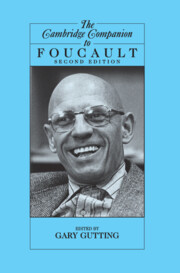Book contents
- Frontmatter
- Introduction Michel Foucault: A User’s Manual
- 1 Foucault’s Mapping of History
- 2 Foucault and the History of Madness
- 3 The Death of Man, or Exhaustion of the Cogito?
- 4 Power/Knowledge
- 5 Ethics as Ascetics: Foucault, the History of Ethics, and Ancient Thought
- 6 Michel Foucault’s Ethical Imagination
- 7 The Analytic of Finitude and the History of Subjectivity
- 8 Foucault’s Encounter with Heidegger and Nietzsche
- 9 Foucault and Habermas
- 10 Foucault’s Relation to Phenomenology
- 11 Against Interiority: Foucault’s Struggle with Psychoanalysis
- 12 Foucault’s Modernism
- 13 Queering Foucault and the Subject of Feminism
- Bibliography
- Addendum to Bibliography, 1993–2005
- Index
2 - Foucault and the History of Madness
Published online by Cambridge University Press: 28 August 2006
- Frontmatter
- Introduction Michel Foucault: A User’s Manual
- 1 Foucault’s Mapping of History
- 2 Foucault and the History of Madness
- 3 The Death of Man, or Exhaustion of the Cogito?
- 4 Power/Knowledge
- 5 Ethics as Ascetics: Foucault, the History of Ethics, and Ancient Thought
- 6 Michel Foucault’s Ethical Imagination
- 7 The Analytic of Finitude and the History of Subjectivity
- 8 Foucault’s Encounter with Heidegger and Nietzsche
- 9 Foucault and Habermas
- 10 Foucault’s Relation to Phenomenology
- 11 Against Interiority: Foucault’s Struggle with Psychoanalysis
- 12 Foucault’s Modernism
- 13 Queering Foucault and the Subject of Feminism
- Bibliography
- Addendum to Bibliography, 1993–2005
- Index
Summary
I amnot a professional historian; nobody is perfect.
Michel FoucaultFOUCAULT AMONG THE HISTORIANS. PART I
Michel Foucault's work always had an ambivalent relation to established academic disciplines, but almost all his books are at least superficially classifiable as histories. His first major work, in particular, seems to proclaim its status in the title: Histoire de la folie a` l'âge classique. One plausible way of trying to understand and evaluate this seminal book is by assessing its status as a work of history.
The reactions of professional historians to Histoire de la foile seem, at first reading, sharply polarized. There are many acknowledgments of its seminal role, beginning with Robert Mandrou's early review in Annales, characterizing it as a “beautiful book” that will be “of central importance for our understanding of the Classical period.” Twenty years later, Michael MacDonald confirmed Mandrou's prophecy: “Anyone who writes about the history of insanity in early modern Europe must travel in the spreading wake of Michel Foucault's famous book, Madness and Civilization.” Later endorsements have been even stronger. Jan Goldstein: “For both their empirical content and their powerful theoretical perspectives, the works of Michel Foucault occupy a special and central place in the historiography of psychiatry.” Roy Porter: “Time has proved Madness and Civilization far the most penetrating work ever written on the history of madness.”
- Type
- Chapter
- Information
- The Cambridge Companion to Foucault , pp. 49 - 73Publisher: Cambridge University PressPrint publication year: 2005
- 8
- Cited by



